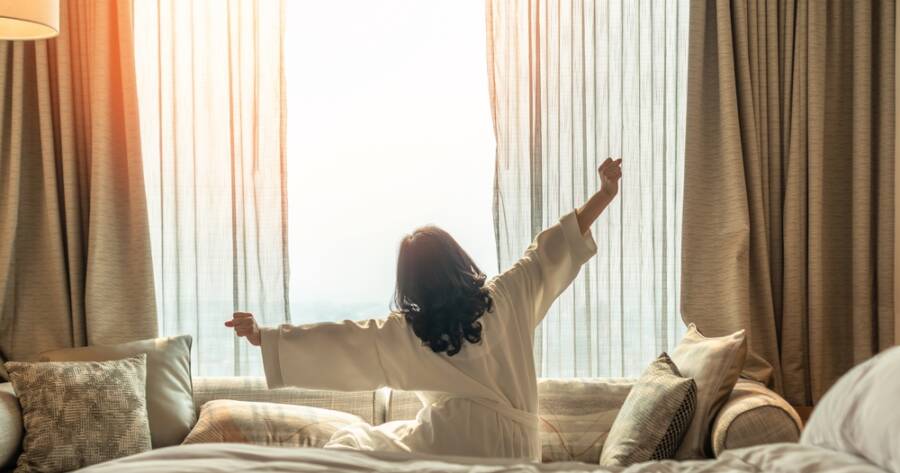The stress, long work hours, and constant connectivity of today’s fast-paced world has resulted in people struggling to get enough sleep. To answer this call of the tired and overwhelmed, a new travel trend has emerged — known as sleep tourism. This unique type of tourism combines travel with a focus on providing a more restful experience with improved sleep quality for travelers. Understand how the sleep tourism trend is changing the way people travel and rest!
The Growing Appeal of Sleep Tourism
More people are realizing the importance of a good night’s sleep. Whether it’s due to personal stress, jet lag, or simply needing a break, the desire for quality sleep has never been greater. This has created a demand for travel experiences that focus on sleep improvement. Many hotels and resorts now offer specialized packages centered around sleep. These packages might include sleep-enhancing amenities such as soundproof rooms, blackout curtains, or calming aromatherapy.
From smart bed mattresses and heated floors to ambient sound generators, sleep hotels make your stay as luxurious and unhurried as possible. Many sleep hotels also offer access to sleep hypnotists who help guests relax and rest better. From wellness retreats in peaceful natural settings to urban hotels with cutting-edge sleep technology, the options are expanding. Sleep tourism appeals to anyone looking to recharge, whether they are frequent travelers, busy professionals, or people recovering from illness.
What Does a Sleep Tourism Experience Look Like?
Sleep tourism experiences can vary widely depending on the destination and the specific offerings of the hotel or resort. A typical sleep tourism package might include a carefully curated environment designed to promote rest. For instance, many hotels provide specialized mattresses and pillows that are designed to support sleep posture. You might also find rooms equipped with air purifiers and temperature controls to create an ideal sleeping environment.
Some destinations go further, offering guests access to sleep-inducing activities. These might include yoga classes, meditation sessions, or nature walks, all designed to help calm the mind and body before bedtime. Nutrition also plays a role, with some places offering sleep-friendly meals and snacks that help support rest.
Guests may also have access to sleep assessments, where professionals analyze their sleep patterns and offer personalized advice. Some destinations even provide advanced sleep technology, such as devices that track sleep cycles and offer feedback for improvement. The goal is to create an experience that goes beyond just relaxation—it’s about truly enhancing sleep.
Why Are People Turning to Sleep Tourism?
There are many reasons why sleep tourism is becoming popular. One of the main reasons is that many people struggle with sleep issues, such as insomnia or poor sleep quality. These issues can take a toll on both physical and mental health. Sleep tourism offers a solution by giving people a chance to focus solely on their sleep, away from the distractions of daily life.
The rising awareness of the health benefits of sleep has also fueled the growth of sleep tourism. Improved sleep can lead to better concentration, stronger immunity, and even a more positive mood. As people become more health-conscious, the desire for sleep-focused travel experiences grows.
Popular Destinations for Sleep Tourism
Sleep tourism is not limited to one type of destination. It can be found in many parts of the world, from serene countryside retreats to luxurious urban hotels. Some of the top cold destinations for sleep tourism include wellness resorts in the Swiss Alps, where guests can enjoy peaceful mountain views and fresh air. 2 These resorts often offer sleep-enhancing activities like spa treatments and relaxation therapies.
In Asia, Japan has embraced the trend with capsule hotels designed for napping and relaxation. These compact, sleep-focused hotels are ideal for travelers looking for a quick and restful stopover. The quiet atmosphere and minimalist design help create a sense of calm, allowing guests to recharge before continuing their journey.
In cities like New York or London, luxury hotels offer state-of-the-art sleep programs that cater to stressed-out urbanites. These programs may include everything from in-room sleep consultations to specialized sound machines that block out city noise. Some hotels even provide sleep concierges, who assist guests in creating the perfect sleep environment.
How to Get Started with Sleep Tourism
If you’re interested in sleep tourism, the first step is to decide what type of experience you’re looking for. Are you seeking a peaceful retreat in nature, or would you prefer a high-tech sleep enhancement program in the city? The key is to find a destination that aligns with your sleep goals.
Keep in mind that sleep tourism isn’t just about lying in bed all day — most people would agree that can be done via a much cheaper “staycation”. Rather, it’s about engaging in activities that help you rest and reset. Whether it’s practicing mindfulness, adjusting your diet, or using technology to monitor your sleep, be open to trying new things that might improve your sleep quality.
Is Sleep Tourism Calling To You?
Sleep tourism is more than just a travel trend — it’s a movement towards better health and well-being. As more people realize the importance of quality sleep, the demand for sleep-focused travel experiences will likely continue to grow.
If you’re fed up with trying to enjoy a moment’s peace amid the rush of a hectic vacation, it’s time to try something different. Whether you’re seeking a peaceful retreat, advanced sleep technology, or personalized sleep coaching, there’s a sleep tourism experience out there for you. By prioritizing rest, you can return from your trip feeling refreshed, recharged, and ready to take on whatever life throws your way.
